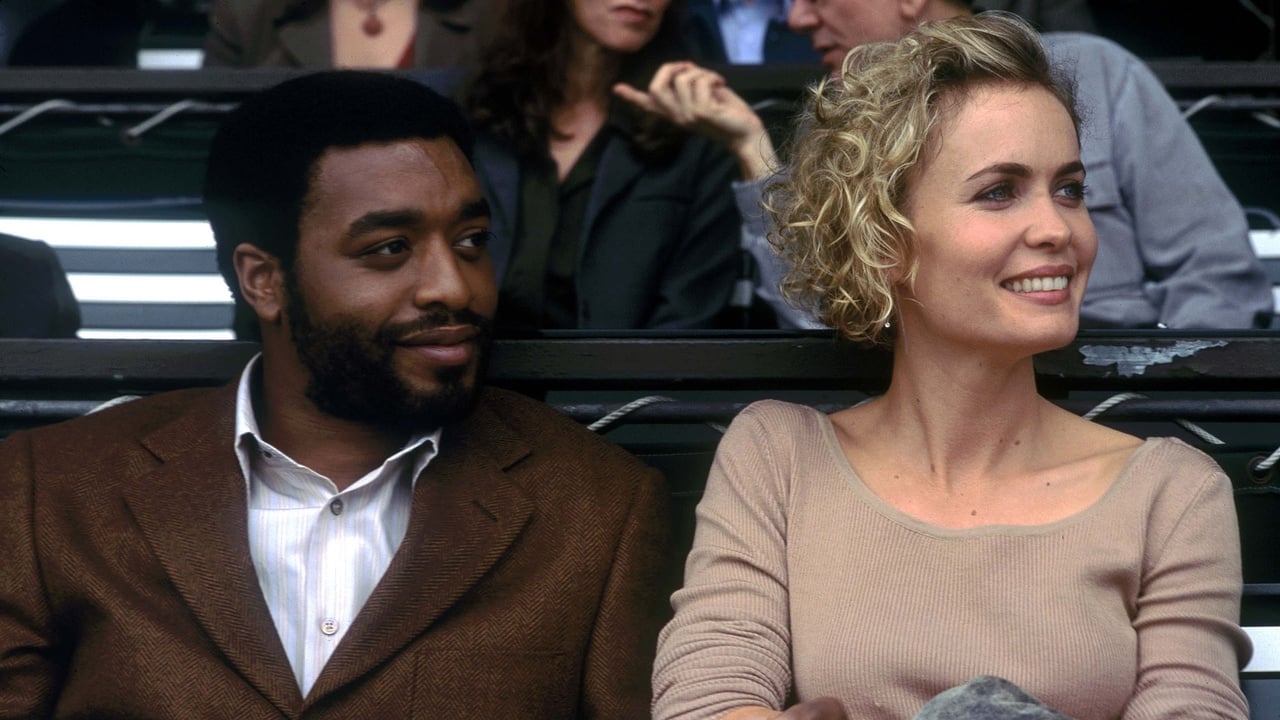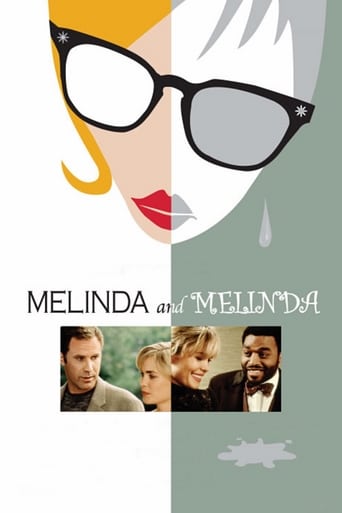ada
the leading man is my tpye
RyothChatty
ridiculous rating
Matrixiole
Simple and well acted, it has tension enough to knot the stomach.
Wyatt
There's no way I can possibly love it entirely but I just think its ridiculously bad, but enjoyable at the same time.
TheLittleSongbird
Is Melinda and Melinda one of Woody Allen's best? To me, no it isn't. Is it one of his worst? Again, no but like a fair amount of Allen's films it seems to be quite a divisive film, and you can see why. Things considered, while not a great film and with some unevenness Melinda and Melinda is a good film but a love-it-or-hate-it one as well. As with almost all Woody Allen films, it's beautifully made- such attractive locations and the cinematography flows from one frame to the other with few problems- and Allen directs very assuredly on the most part if more in the comedy scenes than the dramatic. The music fits with the atmosphere really well and has a nostalgic and catchy quality to it too. The acting is mostly very good, Radha Mitchell shows that she is as easy in comedy as she is in drama, funny and warm-hearted in the comedy scenes and affecting in the dramatic ones. Chloe Sevigny is another one of the reasons that makes the drama more watchable than it is, she looks very natural and plays with emotion, while Amanda Peet is fine too though underused. Will Ferrell was the biggest surprise of Melinda and Melinda, his performance was by far and away one of the best performances of the younger Allen alter-ego characters. Much better than Kenneth Branagh in Celebrity and Jason Biggs in Anything Else, whereas they were pale imitations Ferrell had charm and charisma and made the role his own in a way the other two did not. Not everybody impressed though, Chiwetel Ejiofor is stiff and Johnny Lee Miller is rather one-note in a quite boorish role. I am in agreement with those too that the comedy here is better than the drama. The comedy in Melinda and Melinda was great, very witty and quotable and a lot of it did make me laugh out loud. The scenes with the comedy are bright and breezy and have a light-hearted feel that is most endearing, and the characters while somewhat typically neurotic are relatively easy to engage with and the spirited performances help. The drama is not on the same level(a surprise really because Allen has shown that he can do comedy and quite insightfully and truthfully and those qualities unfortunately didn't come through), some of the dramatic scenes do drag a lot, the dialogue does sound forced and overwrought and the characters are much less likable and interesting than in the comedy story(fairly unusual for Allen, he has been known to have compellingly real characterisation when he takes on drama like in Hannah and Her Sisters and Husbands and Wives). The concept was an ingenious one, one of Allen's cleverest concepts actually, and Allen does make a commendable effort in entwining the two stories together even if it did personally feel a little confusing sometimes and the film does feel like one with two halves. All in all, Melinda and Melinda an uneven film but it is also a good and interesting one and in terms of where it sits within Allen's filmography I'd say somewhere in the middle. 6.5/10 Bethany Cox
SnoopyStyle
Filmmakers and friends argue over whether comedy or tragedy make for better stories in a restaurant. One guest tells a story and both sides cast a comedic or tragic light on it. A disheveled Melinda Robicheaux (Radha Mitchell) crashes in on a Manhattan dinner party with friends. The party is either thrown by Lee (Jonny Lee Miller) and Laurel (Chloë Sevigny) or Hobie (Will Ferrell) and Susan (Amanda Peet) depending on which version of the story. Both stories move forward.This is a writer's delight but I'm not sure if it's anybody else's. The tragedy is a bore. The comedic one has a few funny moments with Will Ferrell. It's better just by his presence. I feel that this is better off as two separate movies. It could have been one of the wonders of cinematic works especially if he uses identical casts in both movies. The two would forever be cinematic debate and film class standards. Instead, this movie is a film oddity.The other problem I have is the opening that puts it in the audiences' face that this is all made up off the cuff. I have never been a fan of that kind of story construction. The audience wants to buy in and this puts them at a distance from the story. The main exception is for kiddie fantasy like 'The Princess Bride'. Generally I don't like films that tell the audience right up front that none of it is real, and none of it matters.Acting wise, Will Ferrell is the most energetic screen presence of the cast. Radha Mitchell does a fair job of differentiating the two story lines. I do want her to separate the two even more, but she's not a natural comedic actress. She puts on her best performance and I can't ask for more.
jerrywarriner
If the audience is supposed to tell which version of the story is a comedy and which is a tragedy, then I can only say, "good luck." There are no visual or audio cues to alert the audience to a switch in the versions. Perhaps a quick wipe accompanied by a sliding sound would alert the viewer to the switch.Even worse, both versions contain elements of both the comic and tragic, so the separation of the versions is even more difficult to discern. If Mr. Allen threw the pages of the script in the air and re-assembled them in no particular order, he could have done no worse.Because, with a few exceptions I'm not familiar with the performers, they looked to me like clones. Perhaps Allen should have instructed them to wear name tags.I like many of Allen's films. The tragic and comic elements in "Crimes and Misdemeanors" are clear cut and don't require captions that read "This is comic" and "This is tragic." The last thing I want to hear from pretentious M&M fans is the comment, "It's so obvious you must be awfully obtuse."
Baron Ronan Doyle
Here I am, for what seems the thousandth time, introducing a review as being of a film from a legendary director whom I've shamefully seen nothing by. Still, better late than never, no?Something of an experimental concept, Melinda and Melinda follows a conversation between two playwrights: one a tragedian, the other a comedian. They each believe their particular form of fiction reflects the true reality of life, and seek to prove this by twisting the same root story to a particular end.On paper, Melinda and Melinda sounds an ingenious idea: telling the same story from different perspectives to discern the differences between comedy and tragedy. Alas, this is not quite what the film actually does with itself. I expected, perhaps foolishly, to see the same scenarios and characters from different perspectives; to perceive the same strings of events through alternating pairs of eyes. What actually happens, in essence, is that we flip between two similar but quintessentially different stories. Their only considerable similarity is in their beginning at a dinner party, which itself lasts not particularly long in either case. This had me somewhat disappointed, my expectations flung from the window and replaced with, you might say, two elongated short films. Melinda and Melinda, contrary to what its synopsis suggests, is not an in-depth examination of comedy versus tragedy, but rather two half films loosely strapped together by occasional and dysfunctional scenes of the original characters summarising the plots thus far. These scenes are wince-inducingly clunky, the performances overstated and criminally redundant. The worst effect of the misuse of the film's premise is that, due to their essential non-relation, the two segments are left to function independently, which neither is well equipped to do. The tragedian element is particularly lacking, none of the characters or circumstances eliciting sympathy, relatability, or anything in the way of the audience's consideration. It's not bad, per se, but nor is it at all good; to watch characters to whom we're not endeared have their lives crumble as a result of infidelity is simply boring. The comic segment excels in comparison, but is itself quite flawed. Much as I might dislike the man in just about everything, Will Ferrell takes centre stage, his early despair at burning his "Chilean sea bass lightly dusted with lime" simply the film's best moment. The positive effect of his presence is short lived, however, the quirky silliness wearing thin before long. Charming nonetheless for most of the running time, he's certainly—I genuinely cannot believe I'm saying this about Will Ferrell—the best thing in the film. The comic section as a whole is certainly better, its humour a lifeboat in the overwhelming sea of boredom its opposite offers. Perhaps a ninety minute expatiation of this would have been better, but alas, that is not what we are given. By the end, it's clear that the original idea has been abused, mistreated, and brutalised beyond all recognition. A typically poorly delivered wrap up from the playwrights informs us that—who'd have guessed!—life is neither tragic nor comic but a combination of the two. No thank you.A great idea so fumbled, mishandled, misused, and dropped on its head in its execution that it bears no trace of the wonderment it first postulated, Melinda and Melinda is just plain disappointing. With one half soporific and the other half enjoyable, it's horribly unbalanced, and punctuated (thankfully) infrequently with very poor summative scenes. Its comic side is fine; its dramatic side banal and bland. In short, it's a complete mess.

